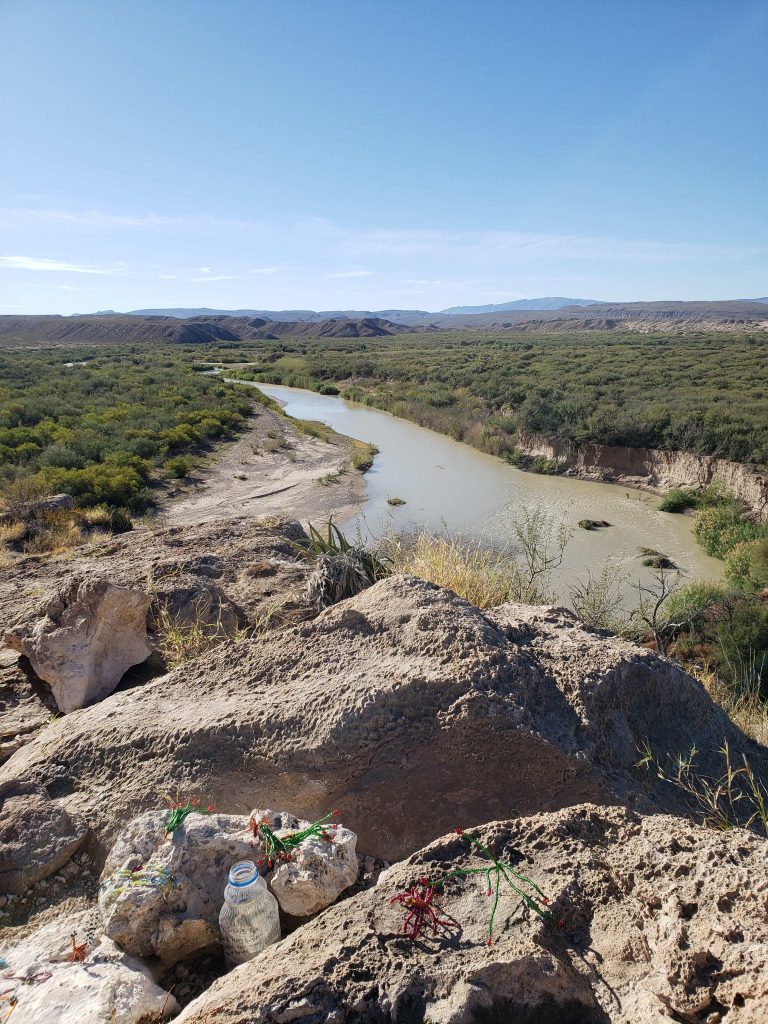“No natural objects, stones, minerals, plants. No meat, fruit or vegetables.” The ranger says. In the corner silently stands a customs and immigration officer in his black uniform, side arm and black covid mask. He could be mistaken for a manikin. He is waiting for the Mexicans to unload the pickup truck outside. They are struggling to release a binding strap securing the cart they will use to bring their pick up truck load of stuffed black plastic bags to the river.
“Enjoy your day.” says the Ranger.
We head out the door for the quarter mile walk to the river. It is a pleasant morning. The sun has taken the chill from the morning air. The little border crossing is the most active site in the park other than the main visitor center. As we walk down to the river edge the row boat is departing the Mexican side with two passengers, a large cooler, several other items and a dog.
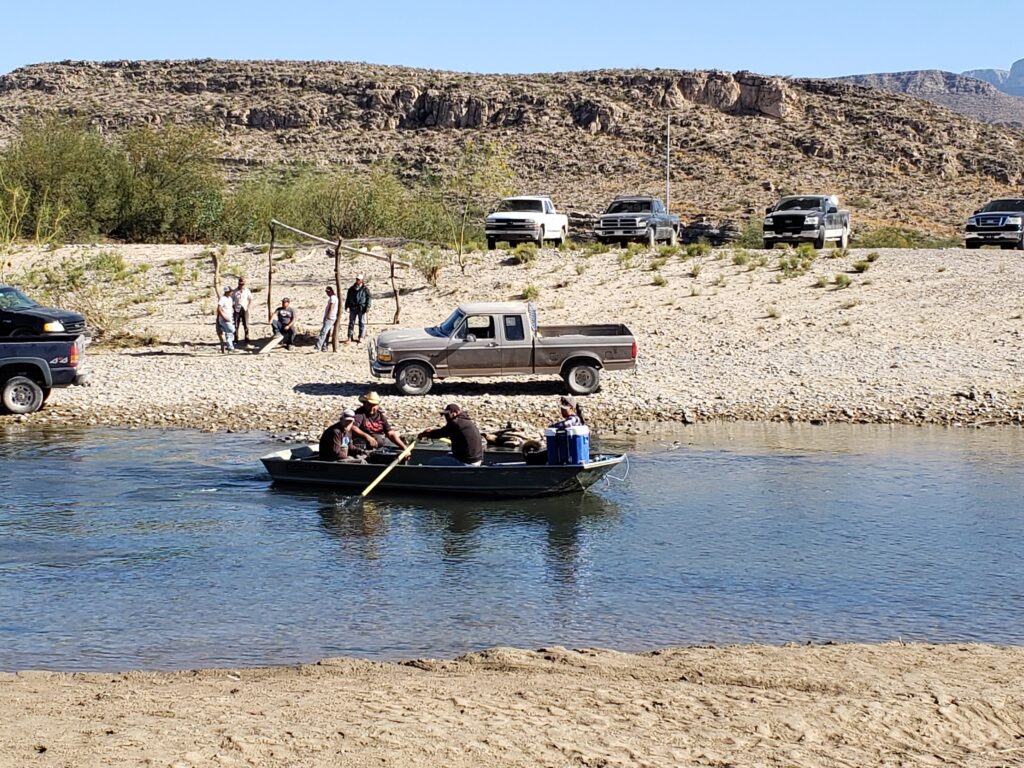
As the boat approaches we hear the voices of Mexicans coming down the trail with a cart full of stuffed black plastic bags. Apparently their efforts to free the cart were successful and the black plastic bags met with customs approval.
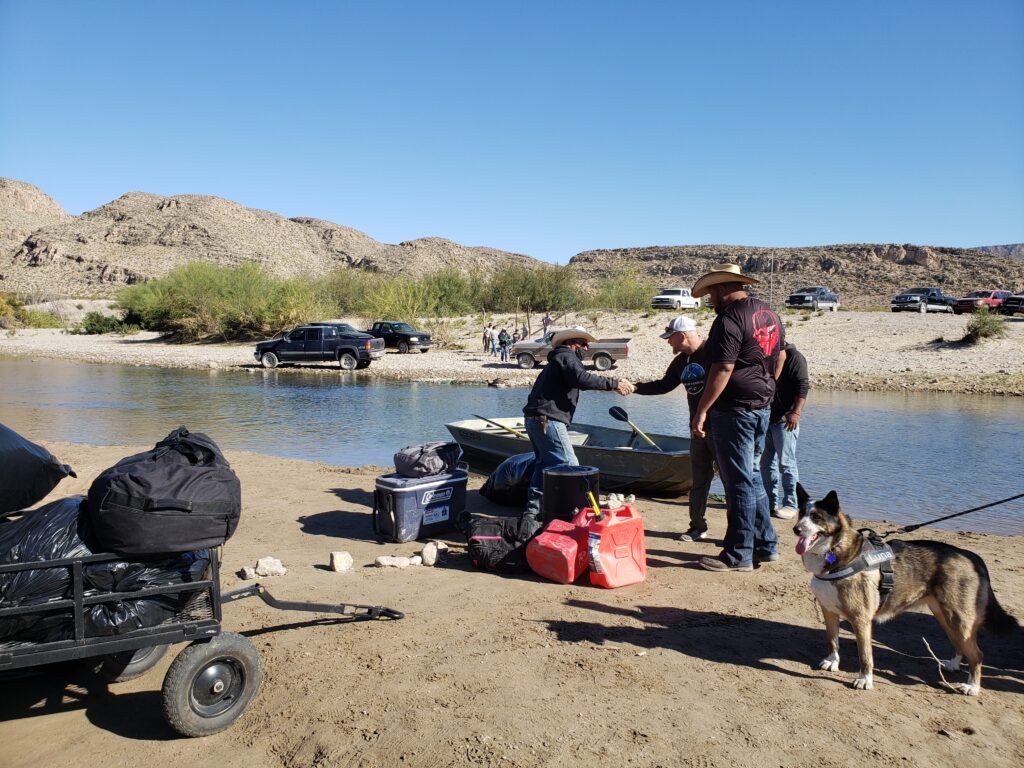
The two passengers, their stuff and the dog are out of the boat and the oarsman is motioning us to step in. It’s a 30 second trip across the 50 foot wide river boundary. As soon as we are out, he heads back to begin ferrying the black plastic bags over.
A man on the bank steps forward.
“Dos? Ten dollar” he says.
“Both ways?” I respond.
“Sí.”
I exchange $10 for 2 blue tickets which I stuff in my pocket. No one will look at them again until they fall on the ground 2 days later while I’m searching for keys.
As we begin to walk up the bank another man steps forward.
“Buenas dias.”
“Buenas dias.” I respond.
“Truck or donkey?”
Lorraine had already cued me that the donkey was a no go.
“Truck.”
“Come” and he leads us up the bank to where three trucks are parked.
“José. Vayas, sí?” he calls out.
José stands up from where he’s been seated in the shade. He’s older man with tired eyes.
“Sí.” he responds and ambles toward the truck.
The truck is a black Ford pickup. One can tell it is black because someone has brushed against it and cleared the dust from a spot on the side.
As José gets in the drivers side the first man opens the passenger doors, one of which swings forward and the other to the back, signaling us to come. As soon as he does he realizes that there is not enough room to squeeze between the open door and the adjacent truck without brushing against it and removing some its dust. He tells José to back up as he closes the doors. He looks at us and motions us back although I don’t think we are in the line with the truck. We take a step back. He trots toward us between the two trucks saying “Back, back.” Four paces back he is satisfied. Apparently José needs plenty of room. With the truck moved he opens the doors again and motions us in with a smile.
“Hola” I say to José .
“Hola. Como estas?”
“Bien” I reply.
José reaches to put the truck in gear but not with his right hand. With his left he reaches over the steering wheel and pushes it down into gear. He makes the turn to pull away using his left arm only steadying the steering wheel with his thigh as he adjusts his hand position on the wheel. José cannot use his right arm. No wonder we needed to stand well away as he backed up.
The windshield is cracked, the dash is covered with a dusty grey carpet and the muffler is no longer attached but the small cross hanging from the rosary beads on the mirror gives me confidence as it swings to and fro. In addition to any divine intervention it may bring it indicates this is José’s truck. He knows it and it knows him.
As we slowly drive up the dry wash, the truck rocking back and forth on the uneven ground I try to strike up a conversation.
“Boquillas is a nice town.”
José responds with something in Spanish.
Perhaps another tact.
“You live here?”
Another Spanish response that I can’t understand. Try again in Spanish.
“Vive aquí?”
“Sí”
José only speaks Spanish. Let’s see. I can count to twenty, use the to be verb in the present tense and bring to mind maybe twenty to thirty nouns in Spanish. It’s enough to get by in the market. It’s not enough for a conversation. The remainder of the trip passes in silence.
The truck rumbles up the last hill out of the dry wash and into the village. Passing a few houses with brightly colored wares displayed on the street he turns the corner and stops in front of José Falcone’s restaurant. He immediately turns to me.
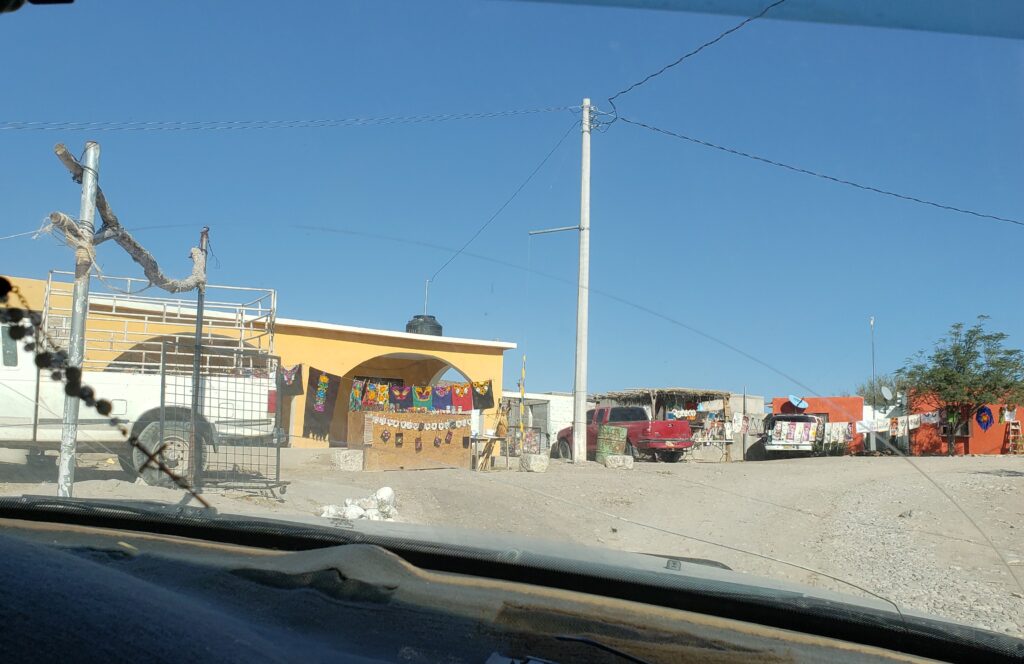
“Un momento.” He’s holding his index finger in the air. His eyes, no longer tired, are focused and serious. “Un momento.” He drops the index finger and reaches for the door handle but does not take his eyes off me. “Un momento.” he says one more time as he slides out of the seat and onto the dusty street. I nod. As he walks around the truck I think that perhaps the passenger door handle does not work from the inside or perhaps he just wants to show his superior service by opening the door for us. I suspect the former is more likely. He opens the passenger doors and smiles.
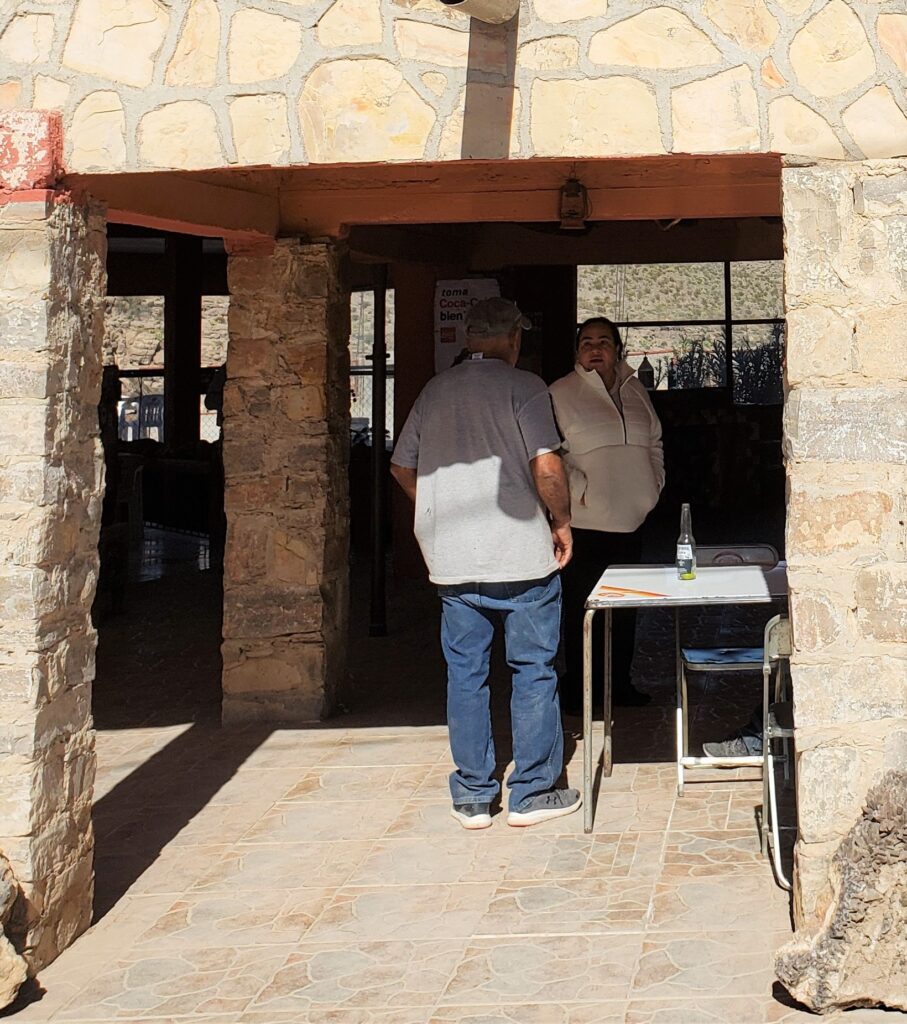
“How much? Cuanto dinero?”
“Cinco”
“Cinco?” I reply thinking five dollars was too low or perhaps he would just leave us here to walk back to the crossing.
“Cinco por uno. Dos es diez.”
“You’ll be here? Estas aquí?”
“Sí” he points to a chair in the shade of the restaurant patio.
“A deal. Bueno, gracias.” I hand him a ten dollar bill.
He walks into the shade of the patio greeting the waiter.
We turn to walk up the street to see the wares displayed in front of the houses. I turn back.
“José. One hour. Un hora.” Now it is me holding my index finger in the air. “Un hora.” He nods from the shade of the patio. We stroll out into the street. A dog sniffs my boot and trots off. We are the only touristas in site.
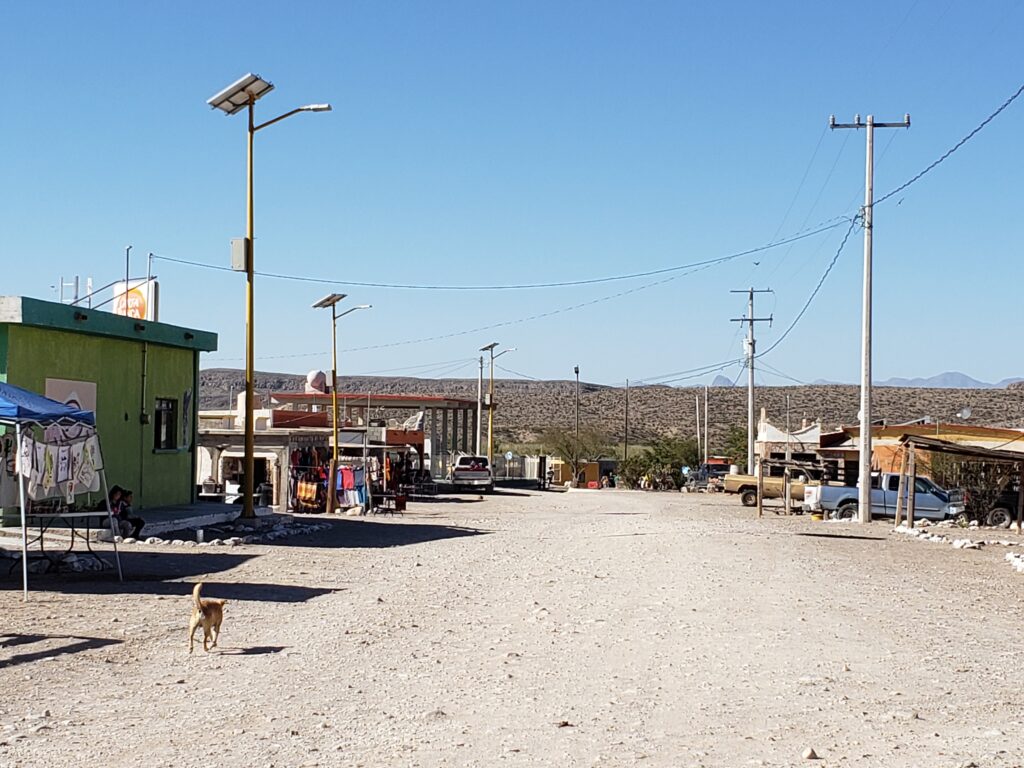
For the vendors this is their livelihood. They are all women. The men guide the horses and donkeys, drive the trucks and help with loading the goods coming across on the little row boat. The women make the wire and beaded trinkets and do the embroidery. As we pass each house a woman will come out. “Hola, You like?” she’ll say pointing to one of her offerings like an embroidery. If you respond with disinterest she’ll pick up another item like a beaded wire Christmas tree. “Christmas tree. You like tree? For your granddaughter? Is beautiful.”
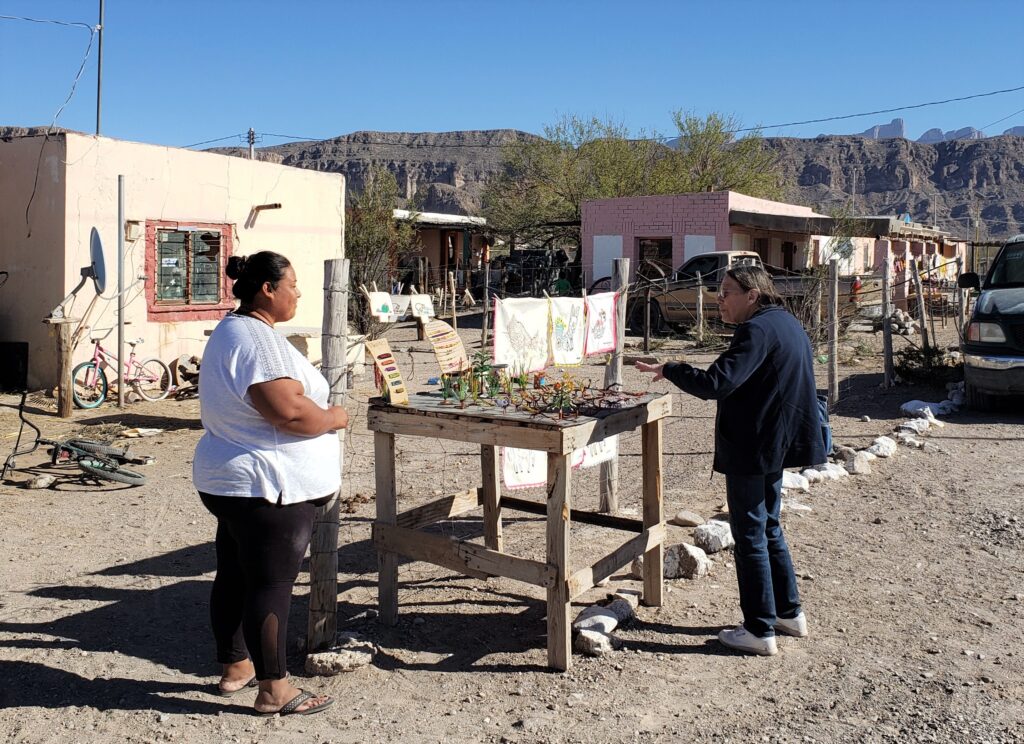
Lorraine is put off by the aggressive selling but I point out it just the way they do things here. Just tell them what you want or tell them no. And all the better if you can get them to reduce the price. She soon gets the hang of it. Both Lorraine and the women of Boquillas did well that morning.
When we return José is sitting in the shade of the patio, sipping a Coke and chatting with friends. I point to the back of patio, he nods and we walk past the man with a guitar who is singing for the guests at the 2 occupied tables. The restaurant patio overlooks the Rio Grande or Rio Bravo as the river is named in Mexico. It is a bright sunny day and the blue water is a reflection of the blue sky. By the time we finish lunch we are the only guests on the patio but the man with the guitar plays on. I drop two dollars in the can he has placed on a table and head into the office to pay the tab. When I return Lorraine is surrounded by three young girls offering their wares. Apparently a transaction is taking place. It will be the last for José is on his feet and walking toward the truck.
He opens the truck doors for us and carefully closes them once we are seated. With José back in the driver’s seat the engine rumbles to life. He backs up a few feet and then manages to execute a U turn in the middle of the main street with one arm. We are on our way back to the river but not fast. A woman steps out into the street. He stops. She has something to tell him. I can’t make out what the conversation is about, but she says a lot and José says a little. Then we are back underway bouncing slowly along the dry wash toward the river.
In the distance I can see more people coming from the river. Five tourists on donkeys are spread across the road ahead. An American family. I can see but not hear the guide, who walks along side, giving commands to the donkeys, his small crop urging the reluctant one to the side. Boquillas is a town of a few hundred people. Everyone knows everyone and surely every vehicle is known. José changes neither course nor speed. The middle of the road is his and the donkeys with their American tourists best be single file and to the side when he passes.
As we pass the I can see the family clearly. The young boy in front, Dad in the rear with Mom and the two girls between. They are clearly middle class Americans. No doubt from a suburb somewhere. Perhaps on their first big trip. The boy holds the reins and looks confidently ahead. The girls, who appear younger, hang on to the saddle horn as the donkeys amble along. It is apparent they have never done anything like this before.
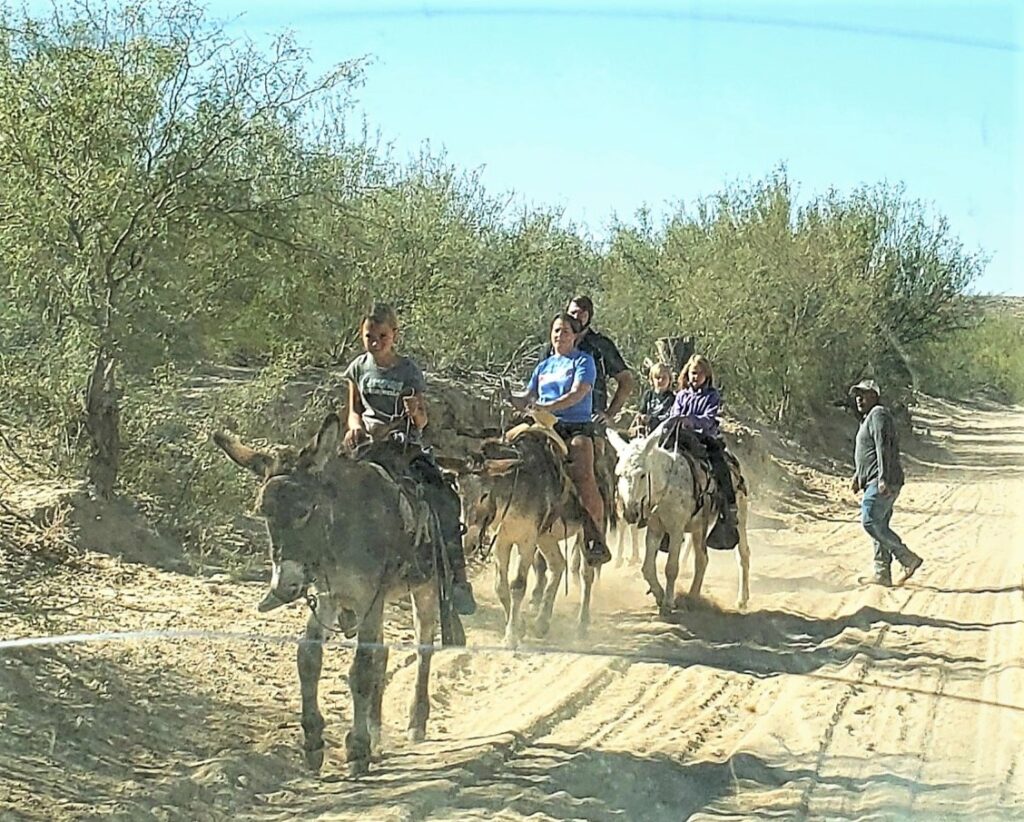
Sixty two years ago the I stood alongside a dusty road in the hot desert sun. The car was stuck in the soft sand where the gravel road crossed a desert a wash. Mom tried to keep us in the shade of a scrawny desert bush while Dad dug with an Army surplus folding shovel. A pickup truck crested the top of the wash and rattled its way to a stop just ahead of the car. Two men in the cab, three women in the back. The women were dressed in long black dresses and colorful blouses. The men in jeans and western shirts. They were Indians. Navajo Indians. Words were spoken but not in English. The women got out of the back of the truck trying not to giggle at the white people so out of their element. One man helped my Mom into the back of the truck then picked up my brother and I and placed us next to her while the other man was busy attaching a chain to the car. Ready to go the truck clunked into gear and began to slowly pull the car, my Dad clearly visible at the steering wheel, out of the sand and up the other side of the wash. The Navajo women had already walked up the slope. I don’t recall the details of what happened once we reached the top of the wash. I just recall standing up in the backseat to peer out the windshield watching the truck with the Navajos disappear in a cloud of dust that grew ever more distant even though we were back underway.
Will one of these kids have such an experience here I wonder. Will they discover the mystery of a different culture or the magic of the desert and its inhabitants? Will they remember decades hence?
The truck rattles to a stop by the river.
“Un momento.” José says. “Un momento.”
